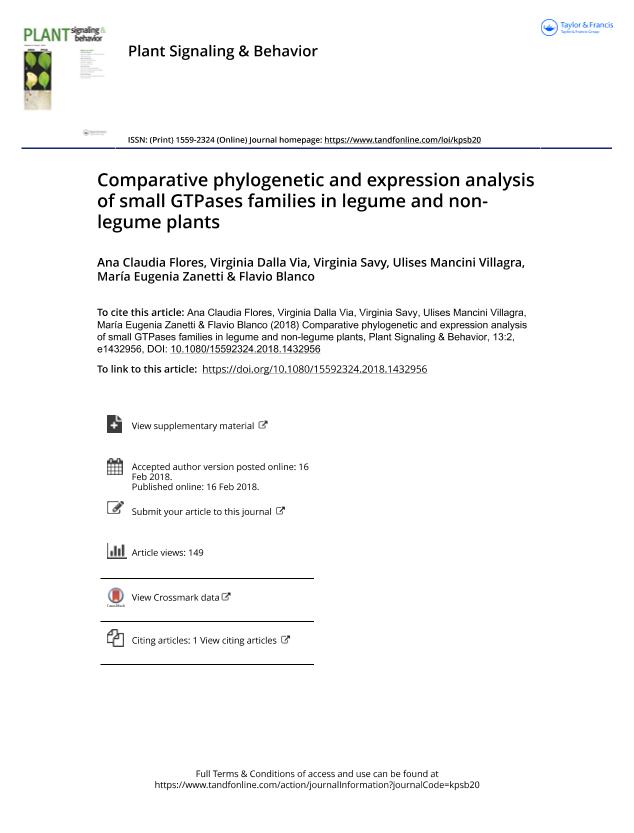Mostrar el registro sencillo del ítem
dc.contributor.author
Flores, Ana Claudia

dc.contributor.author
Dalla Via, Maria Virginia

dc.contributor.author
Savy, Virginia

dc.contributor.author
Mancini Villagra, Ulises Maximiliano

dc.contributor.author
Zanetti, María Eugenia

dc.contributor.author
Blanco, Flavio Antonio

dc.date.available
2020-02-01T02:11:07Z
dc.date.issued
2018-02
dc.identifier.citation
Flores, Ana Claudia; Dalla Via, Maria Virginia; Savy, Virginia; Mancini Villagra, Ulises Maximiliano; Zanetti, María Eugenia; et al.; Comparative phylogenetic and expression analysis of small GTPases families in legume and non-legume plants; Taylor and Francis Incs; Plant Signaling and Behavior; 00; 00; 2-2018; 1-12
dc.identifier.issn
1559-2316
dc.identifier.uri
http://hdl.handle.net/11336/96464
dc.description.abstract
Background: Small monomeric GTPases act as molecular switches in several processes that involve polar cell growth, participating mainly in vesicle trafficking and cytoskeleton rearrangements. This gene superfamily has largely expanded in plants through evolution as compared with other Kingdoms, leading to the suggestion that members of each subfamily might have acquired new functions associated to plant-specific processes. Legume plants engage in a nitrogen-fixing symbiotic interaction with rhizobia in a process that involves polar growth processes associated with the infection throughout the root hair. To get insight into the evolution of small GTPases associated with this process, we use a comparative genomic approach to establish differences in the Ras GTPase superfamily between legume and non-legume plants. Results: Phylogenetic analyses did not show clear differences in the organization of the different subfamilies of small GTPases between plants that engage or not in nodule symbiosis. Protein alignments revealed a strong conservation at the sequence level of small GTPases previously linked to nodulation by functional genetics. Interestingly, one Rab and three Rop proteins showed conserved amino acid substitutions in legumes, but these changes do not alter the predicted conformational structure of these proteins. Although the steady-state levels of most small GTPases do not change in response to rhizobia, we identified a subset of Rab, Rop and Arf genes whose transcript levels are modulated during the symbiotic interaction, including their spatial distribution along the indeterminate nodule. Conclusions: This study provides a comprehensive study of the small GTPase superfamily in several plant species. The genetic program associated to root nodule symbiosis includes small GTPases to fulfill specific functions during infection and formation of the symbiosomes. These GTPases seems to have been recruited from members that were already present in common ancestors with plants as distant as monocots since we failed to detect asymmetric evolution in any of the subfamily trees. Expression analyses identified a number of legume members that can have undergone neo- or sub-functionalization associated to the spatio-temporal transcriptional control during the onset of the symbiotic interaction.
dc.format
application/pdf
dc.language.iso
eng
dc.publisher
Taylor and Francis Incs
dc.rights
info:eu-repo/semantics/openAccess
dc.rights.uri
https://creativecommons.org/licenses/by-nc-sa/2.5/ar/
dc.subject
ARF
dc.subject
BIOLOGICAL NITROGEN FIXATION
dc.subject
COMPARATIVE GENOMICS
dc.subject
RAB
dc.subject
ROP
dc.subject
SYMBIOSIS
dc.subject.classification
Bioquímica y Biología Molecular

dc.subject.classification
Ciencias Biológicas

dc.subject.classification
CIENCIAS NATURALES Y EXACTAS

dc.title
Comparative phylogenetic and expression analysis of small GTPases families in legume and non-legume plants
dc.type
info:eu-repo/semantics/article
dc.type
info:ar-repo/semantics/artículo
dc.type
info:eu-repo/semantics/publishedVersion
dc.date.updated
2019-10-04T13:41:03Z
dc.identifier.eissn
1559-2324
dc.journal.volume
00
dc.journal.number
00
dc.journal.pagination
1-12
dc.journal.pais
Reino Unido

dc.journal.ciudad
Londres
dc.description.fil
Fil: Flores, Ana Claudia. Consejo Nacional de Investigaciones Científicas y Técnicas. Centro Científico Tecnológico Conicet - La Plata. Instituto de Biotecnología y Biología Molecular. Universidad Nacional de La Plata. Facultad de Ciencias Exactas. Instituto de Biotecnología y Biología Molecular; Argentina
dc.description.fil
Fil: Dalla Via, Maria Virginia. Consejo Nacional de Investigaciones Científicas y Técnicas. Centro Científico Tecnológico Conicet - La Plata. Instituto de Biotecnología y Biología Molecular. Universidad Nacional de La Plata. Facultad de Ciencias Exactas. Instituto de Biotecnología y Biología Molecular; Argentina
dc.description.fil
Fil: Savy, Virginia. Consejo Nacional de Investigaciones Científicas y Técnicas. Centro Científico Tecnológico Conicet - La Plata. Instituto de Biotecnología y Biología Molecular. Universidad Nacional de La Plata. Facultad de Ciencias Exactas. Instituto de Biotecnología y Biología Molecular; Argentina
dc.description.fil
Fil: Mancini Villagra, Ulises Maximiliano. Consejo Nacional de Investigaciones Científicas y Técnicas. Centro Científico Tecnológico Conicet - La Plata. Instituto de Biotecnología y Biología Molecular. Universidad Nacional de La Plata. Facultad de Ciencias Exactas. Instituto de Biotecnología y Biología Molecular; Argentina
dc.description.fil
Fil: Zanetti, María Eugenia. Consejo Nacional de Investigaciones Científicas y Técnicas. Centro Científico Tecnológico Conicet - La Plata. Instituto de Biotecnología y Biología Molecular. Universidad Nacional de La Plata. Facultad de Ciencias Exactas. Instituto de Biotecnología y Biología Molecular; Argentina
dc.description.fil
Fil: Blanco, Flavio Antonio. Consejo Nacional de Investigaciones Científicas y Técnicas. Centro Científico Tecnológico Conicet - La Plata. Instituto de Biotecnología y Biología Molecular. Universidad Nacional de La Plata. Facultad de Ciencias Exactas. Instituto de Biotecnología y Biología Molecular; Argentina
dc.journal.title
Plant Signaling and Behavior
dc.relation.alternativeid
info:eu-repo/semantics/altIdentifier/url/https://www.tandfonline.com/doi/full/10.1080/15592324.2018.1432956
dc.relation.alternativeid
info:eu-repo/semantics/altIdentifier/doi/https://doi.org/10.1080/15592324.2018.1432956
Archivos asociados
